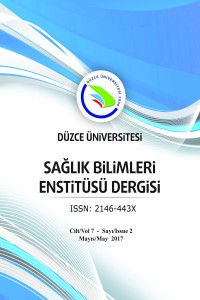Kültürlerarası Duyarlılık ve Etkileyen Faktörlerin Belirlenmesi: Bir Sağlık Hizmetleri Meslek Yüksekokulu Örneği
Abstract
Türkiye çok kültürlü bir toplumsal yapıya sahiptir. Farklı kültürel özelliklerdeki nüfusa hizmet etmek ve güvenli ve etkili bakım sunmak için, kültür ve bakım hizmetleri arasındaki ilişkinin anlaşılması gereklidir. Bu kapsamda çalışmanın amacı, bir sağlık hizmetleri meslek yüksekokulunda öğrenim gören öğrencilerin kültürlerarası duyarlılıklarının ve etkileyen faktörlerin belirlenmesidir. Çalışmaya katılan 229 öğrencinin yaş ortalaması 19,73±1,85 olup %82,1’i kadındır. Öğrencilerin %37,6’sı Çocuk Gelişimi, %32,8’i İlk ve Acil Bakım, %29,7’si Yaşlı Bakımı öğrencisidir. Katılımcıların Kültürlerarası Duyarlılık Ölçeğinden aldıkları toplam puan 88,94±14,12 olup, orta düzeyin altındadır. Etkileşimde sorumluluk alt boyutu puanı 26,33±5,07, kültürel farklılıklara saygı gösterme alt boyutu puanı 22,72±4,32, etkileşimde kendine güvenme alt boyutu puanı 17,59±3,39, etkileşimden hoşlanma alt boyutu puanı 11,14±2,56, etkileşimde dikkatli olma alt boyutu puanı 11,15±2,30 bulundu. Kültürlerarası duyarlılığı etkileyen faktörler ile ölçek toplam puanı arasındaki ilişki incelendiğinde; Çocuk Gelişimi programı öğrencilerinde (p<0,001), başka kültürlerle etkileşimde bulunanlarda (p=0,001), yabancı dil bilenlerde (p=0,001) ve diğer kültürle etkileşimi olumlu olarak algılayanlarda (p=0,002) kültürlerarası duyarlılık düzeyi anlamlı olarak farklı bulundu.
Determination of Intercultural Sensitivity and Influencing Factors: An Example of Vocational School of Health
Abstract
Turkey has a multi-cultural social structure. It is necessary to understand the relation between culture and nursing services in order to serve the population, which has diverse cultural characteristics, and to offer safe and effective care to them. Within this scope, the purpose of the study is to determine the intercultural sensitivity of students at a vocational school of health and the influencing factors. The mean age of 229 students participating in the study is 19.73±1.85 and 82.1% of them are female. 37.6% of the students are studying at Pediatric Development, 32.8% are at First Aid and Emergency, and 29.7% are at Elderly Care. The total score the participants received from the Intercultural Sensitivity Scale is 88.94±14.12 and it is below the medium level. The score for the subdimension of responsibility at interaction was found as 26.33±5.07, the score for the subdimension of respecting cultural differences as 22.72±4.32, the score for the subdimension of self-confidence in interaction as 17.59±3.39, the score of the subdimension of enjoying interaction as 11.14±2.56 and the score of the subdimension of being careful in interaction as 11.15±2.30. When the relation between the factors influencing intercultural sensitivity and the total score of the scale is examined, the level of intercultural sensitivity was found significantly different in students of Pediatric Development (p<0.001), those people who interacted with other cultures (p=0.001), those who knew a foreign language (p=0.001) and those people who perceived interaction with other cultures positively (p=0.002).
Details
| Subjects | Health Care Administration |
|---|---|
| Journal Section | Research Articles |
| Authors | |
| Publication Date | September 24, 2017 |
| Submission Date | October 25, 2016 |
| Published in Issue | Year 2017 Volume: 7 Issue: 2 |



